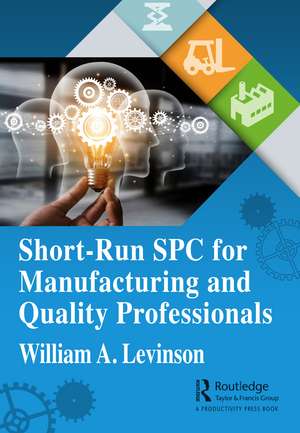Short-Run SPC for Manufacturing and Quality Professionals
Autor William A. Levinsonen Limba Engleză Paperback – 7 sep 2022
Traditional SPC relies on the assumption that sufficient data are available with which to estimate the process parameters and set suitable control limits. Many practical applications involve, however, short production runs for which no process history is available. There are nonetheless tested and practical control methods such as PRE-Control and short-run SPC that use the product specifications to set appropriate limits. PRE-Control relies solely on the specification limits while short-run SPC starts with the assumption that the process is capable—that is, at least a 4-sigma process, and works from there to set control limits. Cumulative Sum (CUSUM) and exponentially weighted moving average (EWMA) charts also can be used for this purpose. Specialized charts can also track multiple part characteristics, and parts with different specifications, simultaneously. This is often useful, for example, where the same tool is engaged in mixed-model production.
Readers will be able to deploy practical and simple control charts for production runs for which no prior history is available and control the processes until enough data accumulate to enable the traditional methods (assuming it ever does). They will be able to track multiple product features with different specifications and also control mixed-model applications in which a tool generates very short runs of parts with different specifications. The methods will not require software beyond readily available spreadsheets, nor will they require specialized tables that are not widely available. Process owners and quality engineers will be able to perform all supporting calculations in Microsoft Excel, and without the need for advanced software.
| Toate formatele și edițiile | Preț | Express |
|---|---|---|
| Paperback (1) | 258.15 lei 6-8 săpt. | |
| Taylor & Francis – 7 sep 2022 | 258.15 lei 6-8 săpt. | |
| Hardback (1) | 891.36 lei 6-8 săpt. | |
| Taylor & Francis – 7 sep 2022 | 891.36 lei 6-8 săpt. |
Preț: 258.15 lei
Nou
Puncte Express: 387
Preț estimativ în valută:
49.40€ • 51.71$ • 40.87£
49.40€ • 51.71$ • 40.87£
Carte tipărită la comandă
Livrare economică 05-19 aprilie
Preluare comenzi: 021 569.72.76
Specificații
ISBN-13: 9781032249896
ISBN-10: 1032249897
Pagini: 98
Ilustrații: 50 Line drawings, black and white; 50 Illustrations, black and white
Dimensiuni: 178 x 254 x 16 mm
Greutate: 0.4 kg
Ediția:1
Editura: Taylor & Francis
Colecția Productivity Press
Locul publicării:Oxford, United Kingdom
ISBN-10: 1032249897
Pagini: 98
Ilustrații: 50 Line drawings, black and white; 50 Illustrations, black and white
Dimensiuni: 178 x 254 x 16 mm
Greutate: 0.4 kg
Ediția:1
Editura: Taylor & Francis
Colecția Productivity Press
Locul publicării:Oxford, United Kingdom
Public țintă
ProfessionalCuprins
Chapter 1. PRE-Control Chapter 2. Introduction to Short Run SPC Chapter 3. Cumulative Sum (CUSUM) Chart Chapter 4. Charts for Multiple Nominals Chapter 5. Acceptance Control Charts *
Notă biografică
William A. Levinson, P.E., is the principal of Levinson Productivity Systems, P.C. He is an ASQ Fellow, Certified Quality Engineer, Quality Auditor, Quality Manager, Reliability Engineer, and Six Sigma Black Belt. He holds degrees in chemistry and chemical engineering from Penn State and Cornell Universities, and night school degrees in business administration and applied statistics from Union College, and he has given presentations at the ASQ World Conference, TOC World, and other national conferences on productivity and quality.
Levinson is also the author of several books on quality, productivity, and management. Henry Ford's Lean Vision is a comprehensive overview of the lean manufacturing and organizational management methods that Ford employed to achieve unprecedented bottom-line results, and Beyond the Theory of Constraints describes how Ford's elimination of variation from material transfer and processing times allowed him to come close to running a balanced factory at full capacity. Statistical Process Control for Real-World Applications shows what to do when the process doesn't conform to the traditional bell curve assumption.
Levinson is also the author of several books on quality, productivity, and management. Henry Ford's Lean Vision is a comprehensive overview of the lean manufacturing and organizational management methods that Ford employed to achieve unprecedented bottom-line results, and Beyond the Theory of Constraints describes how Ford's elimination of variation from material transfer and processing times allowed him to come close to running a balanced factory at full capacity. Statistical Process Control for Real-World Applications shows what to do when the process doesn't conform to the traditional bell curve assumption.
Descriere
Readers will be able to deploy practical and simple control charts for production runs for which no prior history is available and control the processes until enough data accumulate to enable the traditional methods (assuming it ever does).
